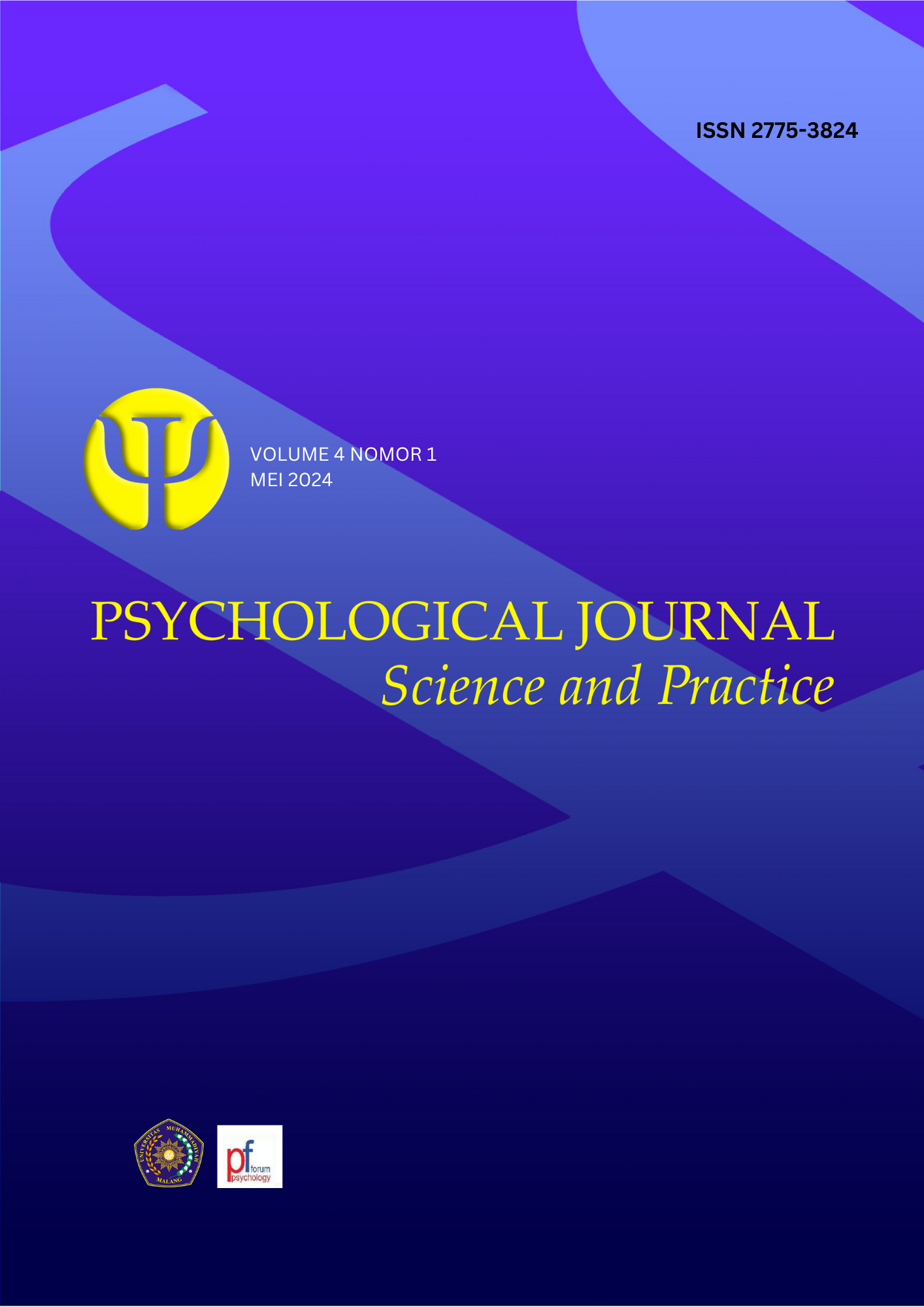Peran pemaafan sebagai mediator hubungan antara kebersyukuran dan kebahagiaan pada remaja di panti asuhan
DOI:
https://doi.org/10.22219/pjsp.v4i1.29710Keywords:
Adolescents, body image, Celebrity worship, self esteemAbstract
Abstract Happiness is everyone’s need, therefore everyone wants it, including teenagers in orphanages. Happinessis related to gratitude, teenagers in orphanages who have a high level of gratitude will have a high level of happiness.
Likewise, teenagers in orphanages who have a high level of gratitude will have a high level of forgiveness. Teenagers in
orphanages who forgive tend to be happier than teenagers who don’t forgive. The purpose of this study was to determine
the role of forgiveness as a mediator in the relationship between gratitude and happiness in adolescents in orphanages.
This study uses a quantitative approach. Subjects were determined through a saturation sampling technique consisting
of 100 teenagers at an orphanage in Malang City. The research instrument uses The Gratitude Questionnaire-SixItem
Form (GQ-6), the Heartland forgiveness scale and the Indonesian version of The PERMA-Profiler scale. Mediation
analysis using Process model 4 by Hayes. The results show that gratitude has a positive and significant relationship to
happiness. The results of this study also prove that forgiveness is able to mediate the relationship between gratitude and
happiness with a value.The conclusion from the results of this study forgiveness can be a mediator of the relationship
between gratitude and happiness in adolescents in orphanages
Downloads
References
Astuti, M., & Suhendi, A. (2013). Implementasi kebijakan kesejahteraan dan perlindungan anak. Sosio konsepsia 4(1) 215-235.
Breckler, S.J., Olson, J.M., & Wiggins, E.C. (2006) Social Psychology Alive, Belmont, CA : Thomson Higher Education.
Butler, J., & Kern, M. L. (2016). The PERMA-Profiler: A brief multidimensional measure of flourishing. International Journal of Wellbeing, 6(3)
Chaplin, T. M. (2006). Anger, happiness, and sadness: Associations with depressive symptoms in late adolescence. Journal of youth and adolescence, 35(6), 977–986. https://doi.org/10.1007/S10964-006-9033-X
Çolak, T. S., & Güngör, A. (2021). Examining the relationship between gratitude and rumination: The mediating role of forgiveness. Current psychology, 40(12), 6155-6163.
Creswell, J. W. (2013). Research design qualitative, quantitative, and mixed method approaches by John W. Creswell.
Desmita. (2010). Psikologi Perkembangan : Remaja Rosdakarya
Dewi P.M.E. (2016). Konsep kebahagiaan pada remaja yang tinggal di jalanan, panti asuhan dan pesantren.
Dwiwadani, C., Hill, P. C., Bollinger, R. A., Marks, L. E., Steele, J. R., Dollin, H. N., Wood, S. L., Hook, J. N., & Davis, D. E. (2014). Virtues Develop From a Secure Base : Attachment and Resilience as Predictors of Humality, Gratitude and Forgiveness. 83–90
Emmons, R. A. & McCullough, M. E (2004) The Psychology Of Gratitude. New York: Oxford University Press, Inc.
Elfida, D., Milla, M. N., Mansoer, W. W. D., & Takwin, B. (2021). Adaptasi dan uji properti psikometrik The PERMA-Profiler pada orang Indonesia. Persona:Jurnal Psikologi Indonesia, 10(1), 81–103. https://doi.org/10.30996/persona.v10i1.4986
Emmons A.R, & Shelton M.C. (2002). Gratitude and the science of positive pcychology. Handbook of positive psycology,18, 459–471.
Ghozali, I. (2021). Aplikasi Analisis Multivariate dengan Program IBM SPSS 26
(A. H. S (ed.); X) Badan Penerbit Universitas Diponegoro.
Hasan, S., & Tiwari, P. (2019). A study on forgiveness and psychological well being among adolescents. International Journal of Research and Analytical Reviews, 6(2), 703–710. Retrieved from http://ijrar.com/issue.php?group=2&month=April-June&year2019=
Hayes, A.F. (2013) Introduction to Mediation, Moderation, and Conditional Process Analysis: A Regression-Based Approach : Guilford Press
Irdam, Ramadhani.S,. Putri.G.A., (2021). Kebersyukuran pada remaja di panti asuhan ‘Aisyiya Kota Padang. Jurnal pustaka mitra 2(4) 223-228.
Irsyad, J.M., Akbar, S. N., & Safitri (2019) Hubungan antara kebersyukuran dengan kesejahteraan subjektif pada masa remaja di panti asuhan di kota martapura. Jurnal Kognisia 2(10) http://ppjp.ulm.ac.id/journals/index.php/kog/article/view/
Kamarulzaman, W., Kamarulzaman, W., Krishnan, S., Ong, A., Huey, W., Binti, S., Zaki, A., & Rahman, A. (2017). Gender differences in the relationship between gratitude and happiness among orphans in Perak. International Conference on Language, Education, Humanities and Innovation : 21 & 22 Januari 2017. 93-100.
Khoiriyah U.H. (2018). Hubungan penerimaan diri dengan kebahagiaan pada remaja di panti asuhan Nurul Abyadh Malang. Fakultas Psikologi Universitas Islam Negeri Maulana Malik Ibrahim Malang.
Lapiana, Adnani B.U., & Karolin R. (2022). Forgiveness, kebermaknaan hidup dan kebahagiaan remaja yang tinggal dipanti asuhan. INNER: Journal of Psychological Research, 1(3), 112–119. Retrieved from https://aksiologi.org/index.php/inner/article/view/292
Lubis, I. R., & Agustini, L. J. (2018). Efektivitas gratitude training untuk meningkatkan subjective well-being pada remaja di panti asuhan. The effectiveness of gratitude training for improving the subjective well-being of adolescents at the orphanage. In Jurnal Psikogenesis. 6 (2).
McCullough, M. E., Emmons, R. A., & Tsang, J.-A. (2002). The grateful disposition: A conceptual and empirical topography. Journal of personality and social psychology, 82(1), 112–127. https://doi.org/10.1037//0022-3514.82.1.112
Mukhlis, H., Koentjoro (2015) Pelatihan kebersyukuran untuk menurunkan kecemasan menghadapi ujian nasional pada siswa SMA. Gadjah mada Journal of Professional Psychology, 1 (3), 203-205. Retrived form https://jurnal.ugm.ac.id/gamajpp/article/view/9395
Neto, F. (2007). Forgiveness, personality and gratitude. Personality and Individual Differences, 43(8), 2313–2323. https://doi.org/10.1016/j.paid.2007.07.010
Novianti, L.E.,Wungu,E., & Purba, F.D.(2020). Quality of life as a predictor of happiness and life satisfaction. Jurnal Psikologi, 47 (2), 93 – 103.http://10.22146/jpsi.47634
Papalia, E.D, Olds, S.W & Feldman, R.D. (2008). Human development (psikologi perkembangan ) Jakarta : Kencana Prenada Media Group.
Pitaloka, D. A., & Ediati, A. (2015). Rasa syukur dan kecenderungan perilaku prososial pada mahasiswa fakultas psikologi Universitas Diponegoro. Jurnal EMPATI, 4(2), 43–50. https://doi.org/10.14710/EMPATI.2015.14890
Priyanka, A. P., & Roshan, L.D. (2018). A Comparative Study of Self Esteem and Level of Depression in Adolescents Living in Orphanage Home and Those Living With Parents. International Journal of Humanities and Social Science Research. 4 (2): 51–53
Rana, Hariharan, M., Nandinee, D., & Vincent, K. (2014). (PDF) Forgiveness: a determinant of adolescents’ happiness. Indian Journal of Health and Well Being.https://www.researchgate.net/publication/325541918_Forgiveness_A_determinant_of_adolescents%27_happiness
Rina, P.A.,Herlan, P.,Martin, A, R., & Dewa.R,Z,A (2022) Hubungan antara persepsi diri dengan kebahagiaan pada remaja. Jurnal Riset dan Konseptual, 7 (2), 288-298. http://dx.doi.org/10.28926/briliant. v7i2.931
Rienneke, T. C., & Setianingrum, M. E. (2018). Hubungan antara forgiveness dengan kebahagiaan pada remaja yang tinggal di Panti Asuhan. Persona:Jurnal Psikologi Indonesia, 7(1), 18–31. https://doi.org/10.30996/Persona.V7I1.1339
Safaria, T. (2014). Forgiveness, Gratitude and happiness among college students. International Journal of Public Health Science. Vol 3, No. 4, pp 241-245
Safaria, T., Diponegoro, A. M., & Bashori, K. (2017). The efficacy of gratitude and forgiveness training to
increase happiness. The Social Sciences, 12(11), 1948–1951.
https://doi.org/10.36478/sscience.2017.1948.1951
Sahuleka, J.M. (2003). Panti asuhan sebagai suatu lingkungan bagi perkembangan anak. (Skripsi tidak dipublikasikan). Fakultas Psikologi Universitas Indonesia, Jakarta.
Sansone R.A, & Sansone L.A. (2010). Gratitude and well being: The benefits of appreciation. Psychiatry (Edgmont), 11, 18–22.
Sareh, B., Alireza, S., & Mojgan, S. (2018). A study on the effect of gratitude on happiness and well being. Iranian journal of health psychology. 1(2) 65–72 https://www.sid.ir/En/Journal/ViewPaper.aspx?ID=754890
Sativa, A. R., & Helmi A.F. (2013). Syukur dan harga diri dengan kebahagiaan remajaJurnalwacana.Psikologi.Fk.Uns.Ac.Id.http://jurnalwacana.psikologi.fk.uns.ac.id/index.php/wacana/article/view/9
Satici, B. (2020). Exploring the relationship between coping humor and subjective happiness:belongingness and forgiveness as serial mediators. Health Psychology Report, 8(3), 228–237. https://doi.org/10.5114/hpr.2020.97329
Seligman. (2005). Authentic Happiness: Menciptakan kebahagiaan dengan psikologi positif. (Y. Nukman, Trans.) Mizan.
Shekhar, C., Jamwal, A., & Sharma, S. (2014). Happiness and forgiveness among college students. Indian Journal of Psychological Science, 7 (1), 88-93.
Sugiyono. (2017). Metode penelitian kuantitatif, kualitatif, dan R&D. Alfabeta
Susanto, R.,S.,Y., & Hartini.,N.(2022). Hubungan antara pemaafan dengan kebahagiaan pada remaja yang memiliki orang tua bercerai. Jurnal Ilmu Psikologi Dan Kesehatan (Sikontan), 1(2), 141–148.
Tarigan, Y. E., & Hartono, S. (2018). Panti asuhan di Surabaya. Jurnal Edimensi Arsitektur I (1) 849–856.
Thompson, L. Y., Snyder, C. R., & Hoffman, L. (2005). Heartland forgiveness scale. Faculty Publications, Department of Psychology. 452. https://digitalcommons.unl.edu/psychfacpub
Thompson, L. Y., Snyder, C. R., Hoffman, L., Michael, S. T., Rasmussen, H. N., Billings, L. S., Heinze, L., Neufeld, J. E., Shorey, H. S., Roberts, J. C., & Roberts, D. E. (2005). Dispositional Forgiveness of Self, Others, and Situations. Journal of Personality, 73. https://doi.org/10.1111/j.1467-6494.2005.00311.x
Worthington, E. L. (2005). Handbook of forgiveness. New York : Routledge Taylor & Francis Group.
Willis, S. S. (2005). Remaja dan masalahnya : Alfabeta
Witvliet, C.V.O., Richie, F.J., Root Luna, L.M., & Van Tongeren, D.R. (2018): Gratitude predicts hope and happiness: A two-study assessment of traits and states. The Journal of Positive Psychology. doi.org/10.1080/17439760.2018.1424924
Downloads
Published
How to Cite
Issue
Section
License
Copyright (c) 2024 Meilianawati

This work is licensed under a Creative Commons Attribution-ShareAlike 4.0 International License.
Authors who publish with Psychological Journal: Science and Practice (PJSP) agree to the following terms:
- For all articles published in Psychological Journal: Science and Practice (PJSP), copyright is retained by the authors. Authors give permission to the publisher to announce the work with conditions. When the manuscript is accepted for publication, the authors agree to automatic transfer of the publishing right to the publisher.
- Authors retain copyright and grant the journal right of first publication with the work simultaneously licensed under a Creative Commons Attribution-ShareAlike 4.0 International License that allows others to share the work with an acknowledgment of the work's authorship and initial publication in this journal.
- Authors are able to enter into separate, additional contractual arrangements for the non-exclusive distribution of the journal's published version of the work (e.g., post it to an institutional repository or publish it in a book), with an acknowledgment of its initial publication in this journal.
- Authors are permitted and encouraged to post their work online (e.g., in institutional repositories or on their website) prior to and during the submission process, as it can lead to productive exchanges, as well as earlier and greater citation of published wor (See The Effect of Open Access).
This work is licensed under a Creative Commons Attribution-ShareAlike 4.0 International License.








